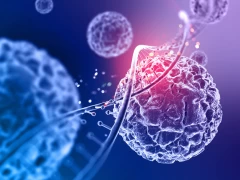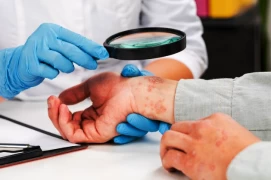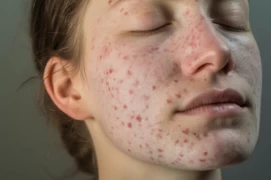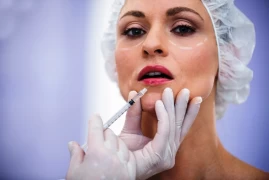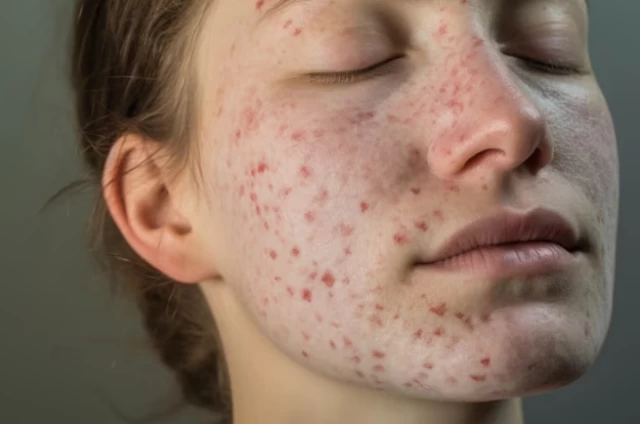
Laser Usage in the Treatment of Acne Rosacea
- Laser Usage in the Treatment of Acne Rosacea
- What Is Acne Rosacea?
- What Are the Causes of Acne Rosacea?
- What Are the Treatment Methods for Acne Rosacea?
- Laser Usage in the Treatment of Acne Rosacea
- In Conclusion…
Today, encountering various skin health issues is quite common. One of these issues is acne rosacea, also known as the red face syndrome, a skin condition characterized by redness, inflamed lesions, swelling, and sometimes discomfort in the eyes. Acne rosacea is a chronic condition that manifests with symptoms such as redness on the face, inflammatory lesions, swelling, and sometimes discomfort in the eyes. There are many different methods for treating this condition, but in recent years, laser treatment, especially vascular lasers, has become an important preference.
What Is Acne Rosacea?
Acne rosacea is a chronic skin condition characterized by redness, inflammatory lesions, swelling, and sometimes discomfort in the eyes. It is commonly seen on the face and particularly affects people in the middle age group, but it can occur at any age. This condition is often characterized by the enlargement of capillaries, making them visible on the surface.
What Are the Causes of Acne Rosacea?
Although the exact cause of acne rosacea is not fully understood, it is considered a complex skin condition that arises from the interaction of various genetic, environmental, and other factors. The factors that trigger or affect this condition include:
- Genetic Predisposition: Genetic factors increase the risk of developing acne rosacea. Individuals with a family history of this condition have a higher risk.
- Changes in Skin Microbiota: Imbalance or changes in bacteria and other microorganisms on the skin surface contribute to the development of acne rosacea.
- Dilation of Blood Vessels: Acne rosacea is often characterized by the dilation of blood vessels on the face, making them visible on the surface. This dilation of blood vessels causes the skin to become red and sensitive.
- Environmental Triggers: Various environmental factors such as exposure to sunlight, extreme hot or cold weather, wind, spicy foods, alcohol consumption, hot beverages, stress, emotional factors, and certain medications can trigger or exacerbate acne rosacea symptoms.
- Dermatological Reactions: Some skincare products, cosmetics, or aggressive skincare practices can exacerbate acne rosacea symptoms by causing irritation and redness to the skin.
- Skin Damage: Prolonged exposure, injury, or damage to the skin during healing, especially on the skin, can trigger the development of acne rosacea.
Each of these factors can affect individuals differently and have the potential to trigger or exacerbate the symptoms of acne rosacea. Although the cause and development of the disease are still not fully understood, it is important in treatment to recognize these triggers and, if possible, avoid them.
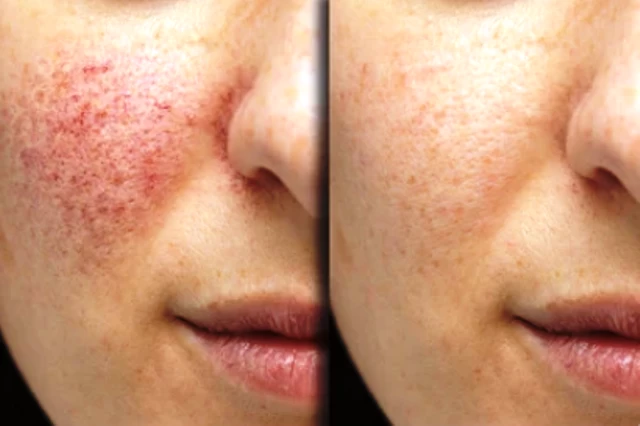
What Are the Treatment Methods for Acne Rosacea?
The treatment of acne rosacea aims to alleviate symptoms and control the progression of the disease. These treatment methods include:
- Topical Treatments: Topical treatments are often effective for mild symptoms of acne rosacea. These treatments are usually creams, lotions, or gels applied to the skin. Among these are products containing metronidazole, azelaic acid, ivermectin, and sulphate, which have anti-inflammatory and antibacterial effects. Your doctor will choose an appropriate topical treatment based on your skin type and the severity of your symptoms.
- Oral Medications: For more severe symptoms, doctors may prescribe oral medications in some cases. These medications typically have anti-inflammatory or antibiotic properties. Antibiotics are often prescribed to reduce inflammation and redness. For example, antibiotics such as doxycycline or azithromycin are commonly prescribed.
- Laser and Light Therapies: Laser and light therapies are becoming increasingly popular in the treatment of acne rosacea. Vascular lasers, in particular, are effective in targeting capillaries in the skin, reducing redness. Intense Pulsed Light (IPL) therapy is also similarly effective. These treatments help reduce redness and spots by narrowing blood vessels.
- Dermatological Procedures: In some cases, dermatologists may recommend dermatological procedures to alleviate the symptoms of acne rosacea. These procedures may include microdermabrasion, chemical peels, and electrocoagulation to close capillaries.
- Sun Protection: Exposure to ultraviolet (UV) rays from the sun can exacerbate acne rosacea symptoms. Therefore, regular use of sunscreen and taking sun protection measures is important. This reduces redness and sensitivity and prevents skin damage.
- Diet and Lifestyle Changes: Some triggering factors, especially spicy foods, alcohol, caffeine, hot drinks, and stress, can worsen acne rosacea symptoms. Therefore, avoiding or reducing these triggers helps control the symptoms.
The treatment plan is usually personalized based on the severity of the patient's symptoms, skin type, and other factors.
Laser Usage in the Treatment of Acne Rosacea
Acne rosacea is characterized by the dilation of blood vessels on the face, making them visible on the surface. This causes the skin to become red and sensitive. Laser treatment is effective in reducing redness, especially by targeting these blood vessels. The main aim of the treatment is to reduce the symptoms of the red face syndrome and improve the patient's quality of life.
The effects of laser treatment on acne rosacea occur by narrowing blood vessels and improving the overall appearance of the skin. Vascular lasers are particularly effective in targeting capillaries. These lasers target the capillaries on the skin surface and narrow them, reducing the symptoms of the red face syndrome and helping the skin achieve a more homogeneous appearance.
Laser treatment is usually applied in a series of sessions. The number and frequency of sessions may vary depending on the patient's skin type, the severity of the symptoms, and the goal of the treatment. The treatment process is usually managed by a specialist dermatologist and adopts a personalized approach for each patient.
Laser treatment is generally safe, but it may have some side effects. These side effects may include mild redness, swelling, temporary pigment changes, and rarely, peeling of the skin. However, these side effects are usually mild and temporary. Following the doctor's recommendations before and after application can help minimize side effects.
In Conclusion…
Laser usage in the treatment of acne rosacea can be an effective option to reduce the symptoms of the red face syndrome. However, since each patient is different, it is important to seek professional help from a dermatologist in determining and implementing the treatment plan. When applied correctly, laser treatment increases the quality of life of patients and helps them feel more confident.
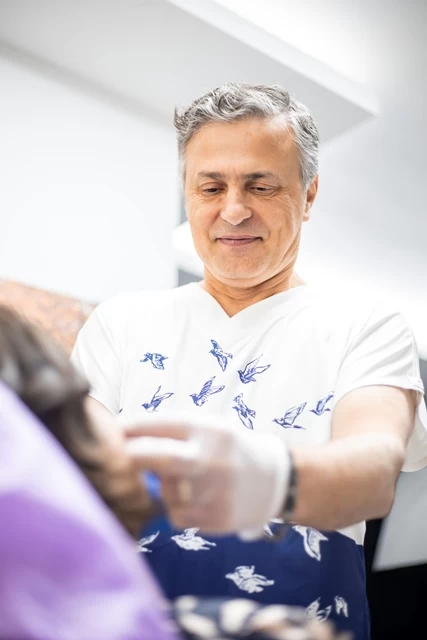
Dr. Yüksel Oltulu
Dermatologist

